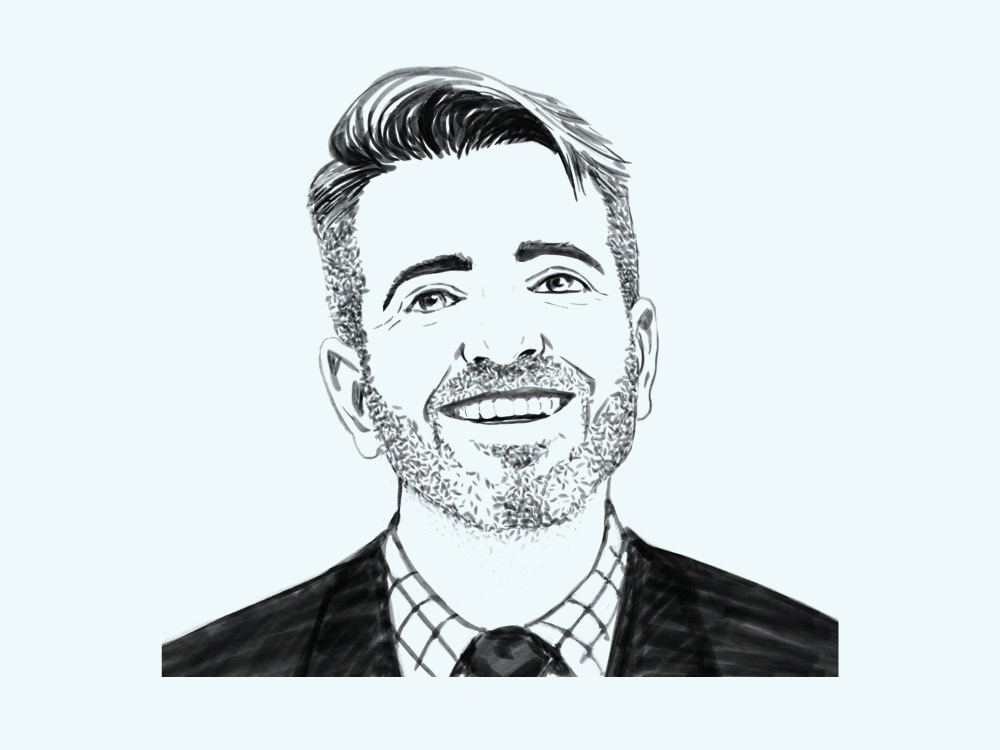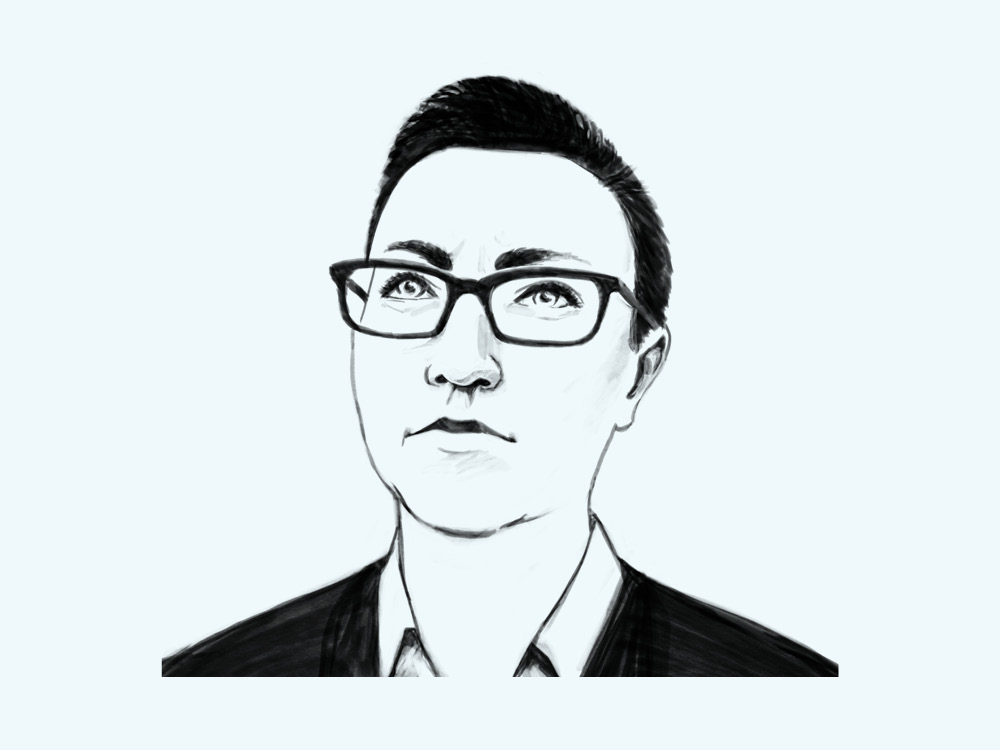
By Annie Harrison, Rabb MS’21
Illustrations by Tal Friedlander
Heller students and alumni are change-makers. They enroll in graduate programs eager to gain the knowledge, practical skills, and quantitative and qualitative analytical approaches to take on profound social policy issues. They challenge themselves to consider their role in effecting lasting social change.
Many Heller alumni focus their sights on improving the U.S. health care system, which is complicated to navigate and riddled with deep disparities for marginalized populations. For a system as complex and broad as health care, true change requires effort from every sector, from clinics to legislatures, from boardrooms to classrooms, and from research labs to neighborhoods and communities.
Heller change-makers write legislation. They work with patients one-on-one. They advocate and organize from the outside. They present and disseminate compelling research. And so much more. No matter the path they take after graduation, our alumni have a shared desire to address injustice and take on long-standing problems to make the world a better place for the future.
We spoke with alumni from four different sectors who shared how they work to improve health care policy, and why they believe their field is a meaningful avenue for change.
Getting Out to the People: Rachel Kramer, EMBA’20
 Dr. Rachel Kramer, EMBA’20, started an obstetrics and gynecology practice two years after residency, but never considered herself an entrepreneur prior to attending Heller. The Executive MBA for Physicians program appealed to her because it harnesses management skills to improve health care.
Dr. Rachel Kramer, EMBA’20, started an obstetrics and gynecology practice two years after residency, but never considered herself an entrepreneur prior to attending Heller. The Executive MBA for Physicians program appealed to her because it harnesses management skills to improve health care.
As a practicing physician and medical director of women’s services at Virtua Medical Group, Kramer observed low cancer screening rates for uninsured patients. Although the state pays for cancer screenings for uninsured women through the New Jersey Cancer Education and Early Detection (NJCEED) program, she found that more than half the patients weren’t showing up to appointments. She says doctors wondered whether the patients didn’t care or didn’t understand what the screening was, or perhaps other obstacles were preventing them from keeping appointments.
After her Heller EMBA entrepreneurship class, Kramer went home and began thinking about what she could do to better reach her patients and offer them care. NJCEED was going into the community on weekends to sign up patients for preventive care, but there was still one problem: the clinic wasn’t open on weekends to provide the services.
Kramer came up with the idea for a mobile medical van that could bring mammograms and Pap smears directly to patients at churches and other community organizations. She wrote a proposal with NJCEED to get a van fitted with equipment, and the project is now in a pilot phase.
Physicians began testing the service by offering mammograms on alternating Saturdays and Sundays to see how the community would respond. The result? There was a line around the block.
“There’s your 54% no-show rate,” Kramer says. “It’s not women who don’t care or don’t understand; it’s just that we’re setting up these artificial barriers to their care.”
She says people in medicine have a tendency to blame the patient by assuming they don’t value the importance of screenings, when in reality, patients may only have one day off from work and are unable to get to appointments during traditional work hours. Part of improving access to health care is combating implicit bias, she notes.
Kramer says patients have shown a lot of enthusiasm about the mobile medical services. Physicians benefit as well, in that they connect with patients where they are and can schedule follow-up appointments for individuals who need them.
“One thing I realized at Heller is that you really have to get to the people,” she says.
Finding the Right Answers to the Right Questions: Tom Mackie, PhD’14
 Tom Mackie, PhD’14, is an associate professor and chair of health policy and management at SUNY Downstate Health Sciences University.
Tom Mackie, PhD’14, is an associate professor and chair of health policy and management at SUNY Downstate Health Sciences University.
He says a foundational lesson from his time at Heller was that rigorous research alone will not generate the transformation needed in the health care system. Mackie says that the role of researchers is being reconceptualized from simply pushing evidence out to policymakers to instead building the partnerships necessary to ensure the research is relevant to the complex and ever-changing landscape of health care.
“Partnerships with patients, providers and policymakers bring the expertise we need to ensure the practice and policy relevance of the research that we conduct,” he says.
As researchers strive to create positive social change, Mackie says it is critical for his team to understand the values and priorities of patients, clinicians, policymakers and other key decision-makers. He explains that his research team engages strategies such as patient co-investigators and advisory boards to ensure the research responds to their priorities.
Such efforts help his team make sure they are asking the right research questions and measuring the right outcomes, says Mackie. His team is then able to produce the evidence needed to shed light on the trade-offs that pertain to practice or policy decisions.
“For example,” he says, “we might want decisions to be made exclusively by what improves health outcomes most, but other factors, such as cost, often influence the option that will be selected, too.”
Mackie adds that academic researchers are expected to remain impartial when conducting research, and a benefit of working in an academic setting is that regulatory policies help ensure research is transparent and conflicts of interest are reported and monitored.
Academia is a training ground for policymakers and practitioners to become critical, thoughtful and informed decision-makers, Mackie says, and this training can happen beyond the classroom. For instance, he has been working with systems engineers to build simulation models that help policymakers integrate evidence into setting key dimensions of policies for universal screening of trauma among children and adolescents.
“In many ways, academic researchers are uniquely situated with the responsibility of equipping decision-makers with best available evidence and then optimally working with them to ensure they know how to contextualize the relevance of that evidence to the decision at hand,” Mackie concludes.
Looking at the Whole Package of Care: Viveka Prakash-Zawisza ’03, MS/MBA’19
 When Dr. Viveka Prakash-Zawisza ’03, MS/MBA’19, first came to Heller, she had been a practicing physician for many years. She enjoyed making a difference patient-by-patient, but had a hunger to make bigger changes within the health care system.
When Dr. Viveka Prakash-Zawisza ’03, MS/MBA’19, first came to Heller, she had been a practicing physician for many years. She enjoyed making a difference patient-by-patient, but had a hunger to make bigger changes within the health care system.
She enrolled in the Social Impact MBA and MS in Global Health Policy and Management programs, wanting to draw on her expertise as a physician as well as seek perspectives outside her field.
“I really fell in love with it, and I felt my calling was in government and the public sector,” she says. “I credit Heller with that.”
In 2019, Prakash-Zawisza joined MassHealth, the state’s Medicaid agency, as the medical director for MassHealth Payment and Care Delivery Innovation (PCDI), and now oversees the clinical aspects of care delivery. In speaking with providers, she says she investigates what is going well, what the challenges are and what can be improved. In speaking with patients, she assesses the efficacy of health care delivery.
Health care has been a significant part of the Massachusetts state budget, even before COVID-19. According to the Massachusetts Budget and Policy Center, 36% of total state spending, or $16.7 billion, went to MassHealth in fiscal year 2019.
In 2018, MassHealth launched an innovative program to reimagine health care payment and care delivery based on person-centered accountable care. The goal was to move away from a fee-for-service structure and toward a value-based structure in which providers look at the whole package of care.
For a patient who has severe diabetes, Prakash-Zawisza explains, this could mean that instead of being seen once every few months, they are connected with a care team that could include a nutritionist to make sure they are eating well, a social worker to ensure they are safe at home, and specialists such as a nephrologist or cardiologist.
“We’re thinking about that whole universe of care that the patient needs and how to make that work well and efficiently,” she says.
Prakash-Zawisza says the public sector has a tremendous privilege of setting the tone for the whole health care landscape. MassHealth serves about 25% of residents in the Commonwealth, and has the ability to model progressive concepts in health care that the commercial sector might emulate.
“As a government entity, we can push innovation in a really interesting way,” she says.
Elevating Marginalized Voices: Jessie Zimmerer, MPP/MA’12
 Jessie Zimmerer, MPP/MA’12, says her training at Heller helped provide a foundation for understanding how the complicated U.S. health care system has both improved people’s lives and let many people down.
Jessie Zimmerer, MPP/MA’12, says her training at Heller helped provide a foundation for understanding how the complicated U.S. health care system has both improved people’s lives and let many people down.
“Health care, or the lack thereof, plays such a key role in the economic stability of families, and that stability can, in turn, determine what kind of housing you live in, where you go to school, whether or not you go to bed hungry ... and it has even been shown to relate to how often you vote,” she says.
Zimmerer is a campaign manager at Community Catalyst, a Boston-based organization that provides funding and strategic coaching to state and local groups across the country working to change health care policies at all levels, with the goal of improving coverage, access, equity and quality in health care systems.
In addition to the experience she gained at Heller, Zimmerer made professional contacts that helped her follow her interests in this realm. She has reached out to former classmates and faculty for advice over the years, and her current boss, Eva Marie Stahl, also is a Heller alum.
Prior to her role at Community Catalyst, Zimmerer worked for elected officials in New Hampshire and Massachusetts. While she enjoyed helping to write laws and found it meaningful work, she also recognized that elected leaders cannot exist in a vacuum. They need smart, dedicated and well-organized grassroots partners to provide expertise and an impetus for change.
“This is certainly true when it comes to Medicaid expansion or premium subsidies, but it’s also true when you think about broader civil rights frameworks,” she says. “Black Lives Matter and other Black-led civil rights groups, LGBTQ+ rights groups, abortion rights groups, immigrant rights groups ... are the primary connectors of people to movements, and those movements are what inspire policy change.”
Zimmerer believes advocacy is the place where people whose interests have been specifically and intentionally decentralized can most effectively demand reparation at this moment. Advocacy work helps ensure that the voices of people directly impacted by policy are front and center, pushing institutions to change.
“Essentially, advocacy is an important part of the wheel that moves us forward,” she says, “just as policymakers, academics and direct service providers all play important roles and intersect with one another.”
